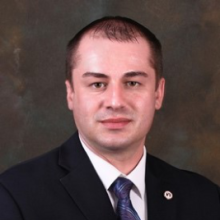After hours of debate and multiple rounds of amendments, House Democrats finally cobbled together the votes to pass two highly controversial bills that would nullify local renewable energy zoning ordinances.
House Bills 5120 and 5121 were passed late Thursday night on identical party line votes: 56 Democrats in favor of the bills, 52 Republicans opposed and two representatives absent and not voting.
The bills create a one-size-fits-all approach for Michigan’s communities, giving an appearance of local control while mandating that local governments follow state requirements to retain a local say for these facilities.
Even with last minute-amendments offered to generate enough votes for passage in the House, MFB Legislative Counsel Andrew Vermeesch warns the legislation will tie the hands of local townships, as well as create an alternative pathway for the Michigan Public Service Commission to expedite the permitting process of large-scale energy projects.
“Similar to the diversity of Michigan agriculture, each community is equally diverse,” Vermeesch said. “This package fails miserably in striking a balance between renewable energy, land use, private property rights and farmland preservation.”
Vermeesch encourages individuals to contact their state senators as the legislation moves forward through the legislative process. Send a prewritten or personalized message from https://bit.ly/MIFBenergy or text ‘MIENERGY’ to 52886.
Over 2,000 people have responded to MFB’s action alert on energy siting, sending more than 4,000 messages to lawmakers opposing the legislation and expressed their support for keeping local zoning decisions in the hands of locally elected officials.
“While it’s certainly disappointing that these bills were passed in the House, the fight is far from over,” Vermeesch added.
“The responsibility to protect grassroots governance in Michigan now rests in the hands of the Senate, where Michigan Farm Bureau and other organizations opposing this legislation will focus our attention."
Along with MFB, the Michigan Townships Association, Michigan Agri-Business Association (MABA), Michigan Association of Counties and Southeast Michigan Council of Governments also remain opposed to the legislation and will continue the fight to retain local authority.
Under the House bills, if a township adopts the mandated state requirements or less restrictive versions, renewable facilities would be required to apply with the local government. But — it comes with a short, four-month timeline to act on the application, with an option for extension only if mutually agreed upon.
“Despite the amendments, this legislation continues to disregard the local efforts of townships and their residents who have already created ordinances allowing the placement of facilities on tens of thousands of acres,” said Neil Sheridan, executive director of the Michigan Townships Association (MTA).
“We thank those representatives who voted to oppose this inequitable legislative attack on local authority that unduly forces these facilities into Michigan’s rural communities, rather than seeking an equitable, balanced statewide approach to clean energy.”
Further, the legislation allows an unfettered amount of land in a community to be used for these facilities, potentially changing its very nature and characteristics for decades to come. In addition, decibel levels remain unreasonably high, and the legislation would not permit any setback deviations from state standards.
“This legislation will effectively silence small town voices on an issue with major implications for the future of rural Michigan, and the last-minute amendments to these bills do not change that impact,” MABA President Chuck Lippstreu.
“Renewable energy siting needs to be deliberate, thoughtful and inclusive of input from local leaders and community members, and we oppose these bills because they disregard the perspectives of rural, agricultural communities in our state.”
Share Story
Article Tags


